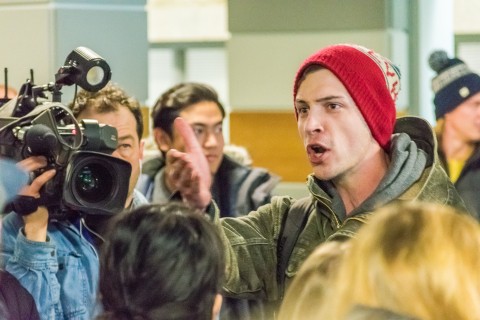
Student Erik Carey was among those who spoke out against protestors at the rally in North Concourse.
On March 23 at the University of Saskatchewan, students held a rally in the North Concourse to protest the acclamation of the newly elected president of the University of Saskatchewan Students’ Union, Coden Nikbakht.
This rally was held as a concerned response to the allegations on social media — made during the election — that the president-elect has sexually assaulted an unspecified number of women. It also took issue with comments made by Nikbakht during an election forum. Now, the protest and the accompanying campaign to remove Nikbakht from office have been dominated by concerns over the sexual-assault allegations.
At the rally, there were several individuals who heckled the protesters, demanding to know what evidence these allegations were staked on. They argued that Nikbakht’s rights have been violated and that his reputation has been ruined, despite an absence of forthcoming evidence.
Indeed, what about the right to due process? What about the right to due process for the survivors? After all, this is what the protest and the #MeToo movement have been about: the lack of due process for survivors of sexual assault. Not only that, it is about the flaws in the legal system that due process currently creates.
In many cases of sexual assault or sexual misconduct, the evidence is not enough to prove the charge beyond a reasonable doubt. But, a not guilty verdict does not mean it did not happen. In cases such as these, the right to due process fails to deliver justice to the survivors of sexual assault.
For these sexual-assault survivors, there is often an accompanying fear of suffering legal retribution — perpetrators can resort to such measures as suing the victims for defamation. Alongside the trauma that such assaults create, these conditions often prevent individuals from coming forward with their stories. What we end up with is a fundamental failure of the legal system to provide justice for these people.
The legal system is meant to use the coercive power of the state to correct deviant behaviour. When this system fails, the social system steps up, and that is what we are seeing now on campus.
At the Gordon Oakes Red Bear Student Centre after the rally on March 23, one individual explained that women have had their own mechanisms for warning each other about dangerous men throughout history — the difference now is that the message is louder. The warning is being transmitted to the broader social system, and the system is responding, correcting the deviant behaviour.
And really, this is no longer just about Nikbakht or the individuals he allegedly assaulted. This debacle has become a metaphor for the wider social conversation surrounding rape culture. In the eyes of student protesters, whether rightly or wrongly, Nikbakht fills the role of men in positions of power who think that they can get away with abusing women and other oppressed groups.
These protesters are not just a small group of students protesting the election of someone they see as unfit for the role of student union president. Rather, they are the manifestation of a wave of righteous fury that has swept through Canadian and American society in the past year.
And, the hecklers are not just a few students who disagree with the protestors but represent other reactionary supporters of the status quo who would stand in the way of this desperately needed social and legal change.
At the end of the day, Nikbakht must understand that his position in the USSU is not just an administrative one. It is a symbol of the union and the university more broadly — and symbols are what people believe them to be.
Right now, there is a significant portion of the student body that believes Nikbakht does not care about their safety and may even be an active threat to it. If Nikbakht cares about the concerns of the student body that he claims to represent, then he will resign out of respect for these views.
Moreover, some important questions have yet to be answered. Why did he not come forward when these allegations first came to light to try to resolve this through dialogue with the student body? Why did it take him two days to make any statement at all?
—
Aaron Hertes
Photo: David Hartman
Leave a Reply